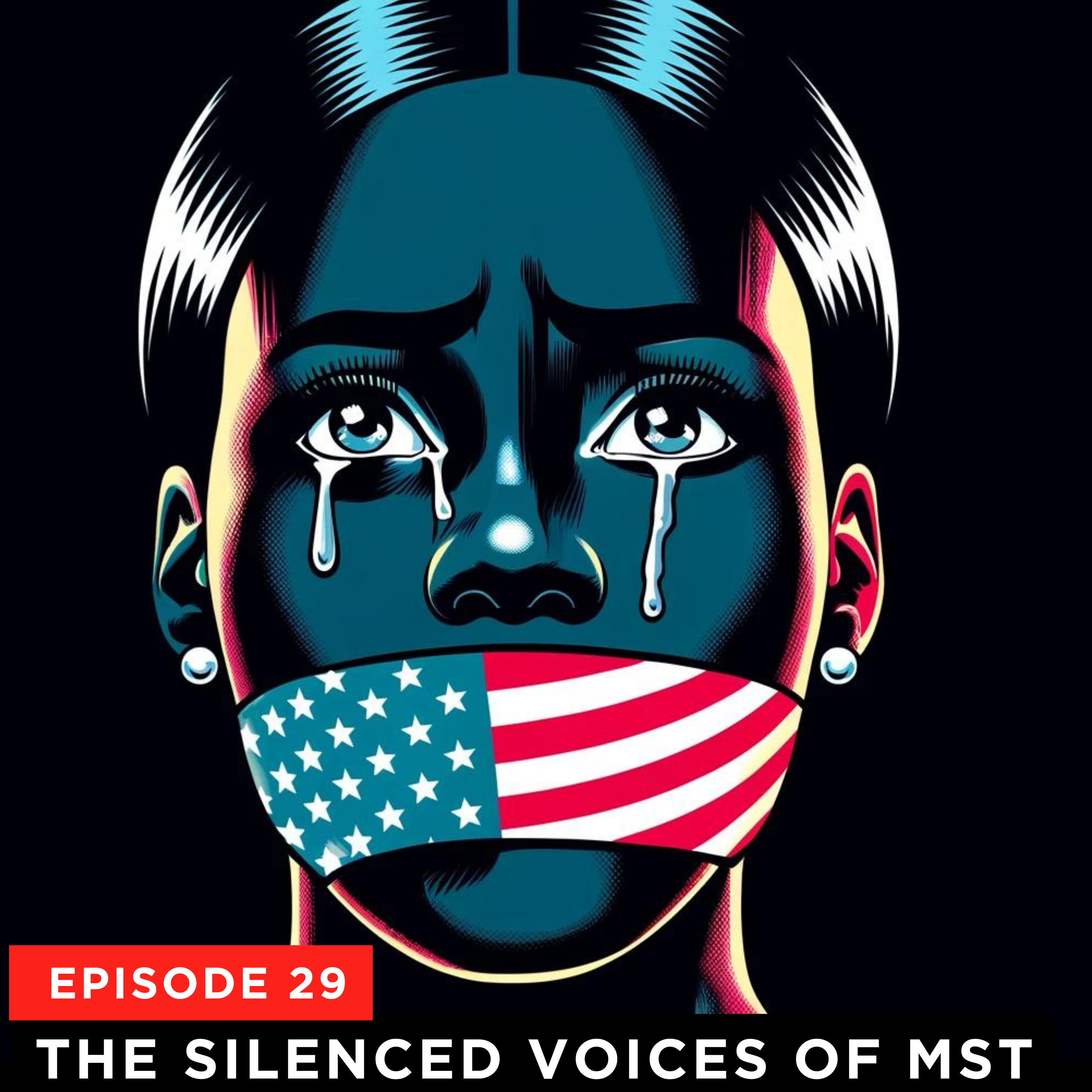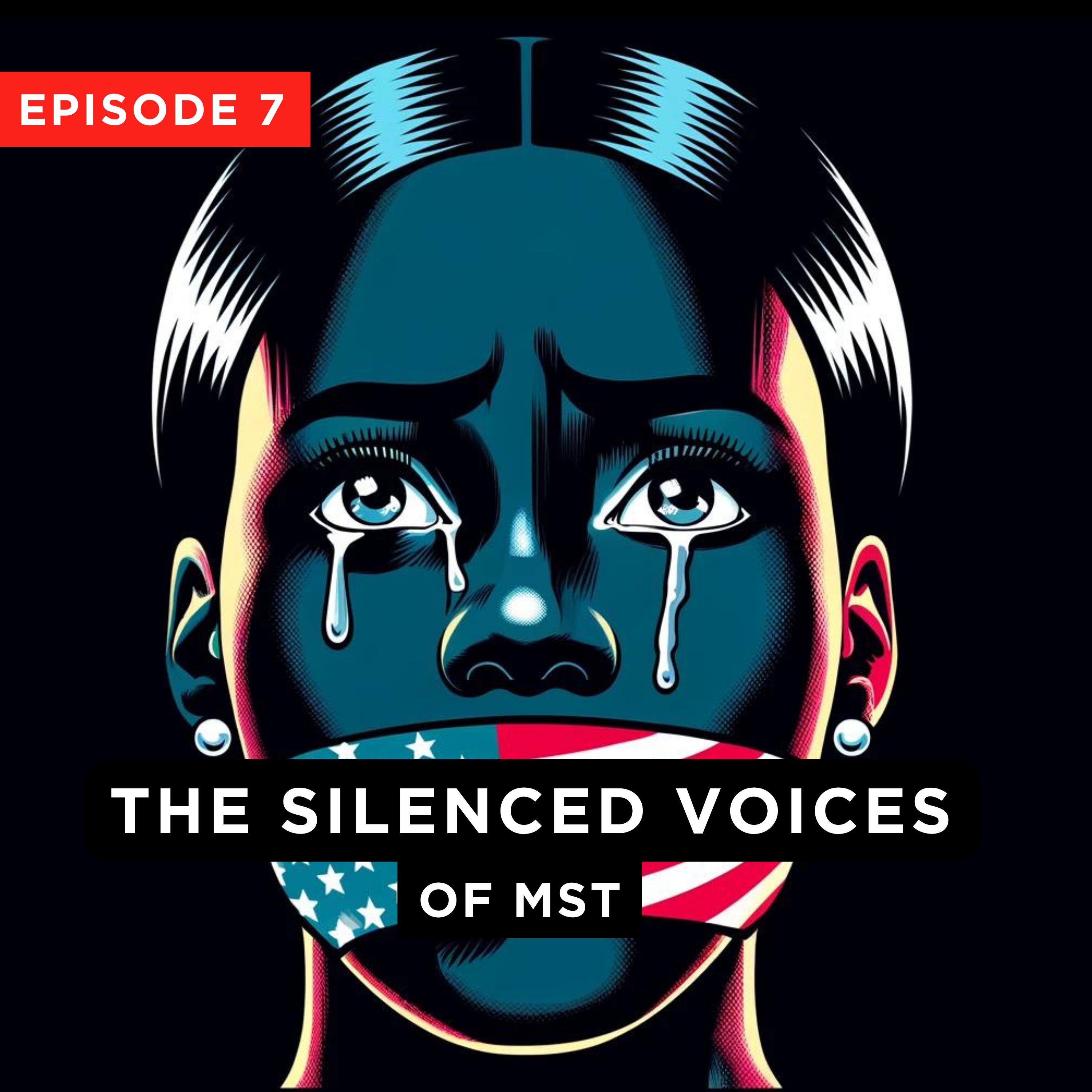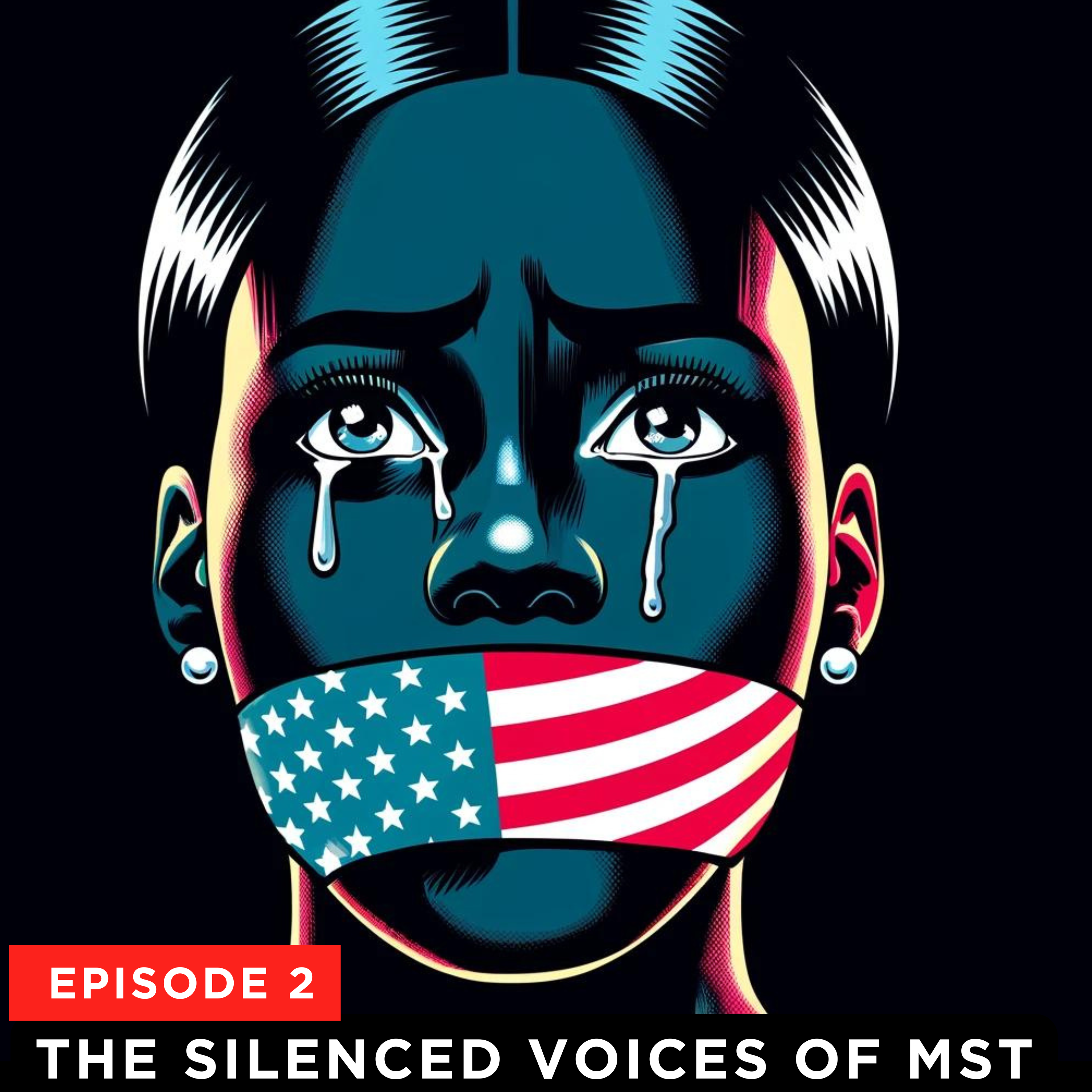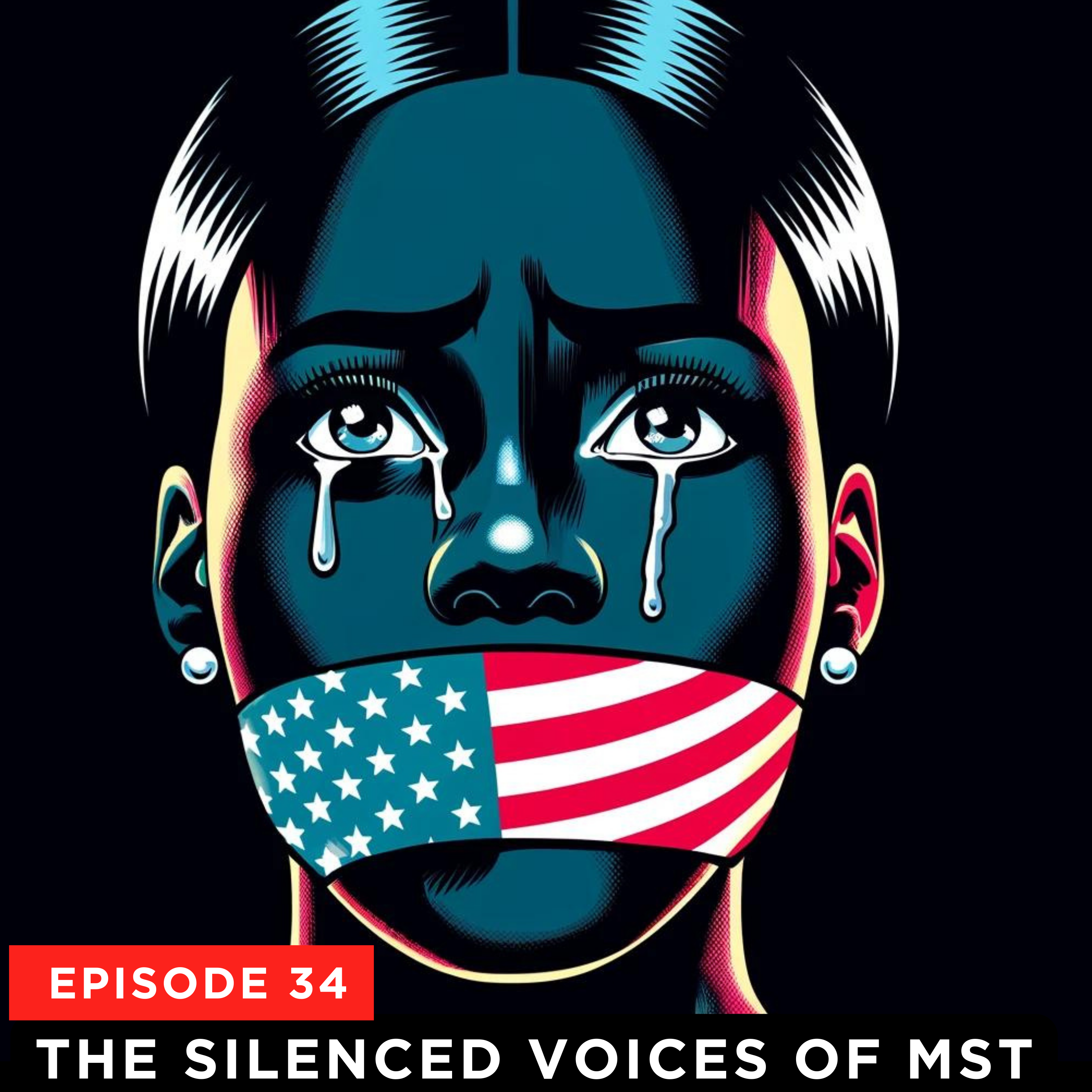Episode Transcript
[00:00:00] Speaker A: Foreign It's Rachelle here, host of Silence, Voices of mst. It's been a long time and my apologies for that. I went through about a very serious illness from about Halloween up until the new year. Turns out having Covid twice and then an upper respiratory infection in between that and then getting a Covid and flu vaccine after all of that isn't a good idea. So don't go through that yourself. Just take it from me, I promise. So, time to get the show started again. I know it's been a really long time. It has to be at least in September, since there's been an episode. And again, my apologies for that. You're gonna notice it's a little different, and that is because of feedback that I got from people in our Facebook group and also from Reddit. So thank you for that. I think that it has improved the show a lot. One thing in particular is there will be extensive trigger warnings now right before the triggering content starts in someone's story. So there'll be a fair warning and a pretty good descriptor of what's coming so you can decide whether or not you're in a place to watch that. And if you're not, I've gone ahead and broken up the episodes into three parts or two parts, depending on the length of the interview, because the goal of this podcast is not to trigger our listeners to the point of not being able to function or having to have an emergency session with their therapist. The point is knowing that these things can happen to a person and still they can make it through and have a good life and share those lessons and what's working for them in terms of coping or treatment and sharing that with you, the listeners. So the first part of each episode will be our guest's story. You know, life prior to joining the military, them joining the military, and then their trauma and part of the aftermath of said trauma directly afterward. Then the second part will move on to them, trying to make sense of what's happened to them, if that's going to the va and trying to get enrolled or trying to find methods of comfort, whether they're healthy or unhealthy. You know, we all go through our phases of just trying to cope. And then the third part will definitely be the lessons learned. What methods of coping is working from them that's healthy.
So that could be meditation therapy, floating. A lot of the things that we've talked about before. In this case, our very first episode back is with a young man named Brian. He is a Marine Corps veteran and I do believe this might be one of the most fascinating people I have ever met. He is still wrestling with this every single day and yet he has this determination and this grit and this sense of humor that I just, you know, attached myself to and absolutely loved. And he is a wonderful man. I'm very honored to be able to share his story because his goes back from like early 2000s, so before 911 even happened. So if you are too young to know what life was like in the 90s and early 2000s, things were very different. And then that one big event happened in all of our lives that we all remember exactly where we were and how old we were and maybe even what we were wearing. But Brian had this event in his life months before 911 was even a thought. So him going and sharing his experience when our culture wasn't as accepting of anything happening to men, sure there's a stigma now, but it was way worse back in the only 20 years ago. I'll leave him to share the rest. It's better to hear straight from him. But I do want you to take that into consideration that this was in the early 2000s, so life was different then. Again, if you want help processing this episode or just need to discuss your own story, we're always here for you in the Facebook group. Please feel free to leave Brian a message. I know he would really appreciate it. You'll see his episode on our website, silence voicesmst.com thank you again for your patience while I got back to health. And we'll see at the end of the episode for more detail. And here's Brian to share his story with you.
[00:04:23] Speaker B: Sure. My name is Brian. I am a writer and producer, founder of a production company called AP Media. I'm also a United States Marine Corps veteran and MSC survivor.
[00:04:36] Speaker A: Thank you. Well, we're just gonna start with your early life. What influenced you to join the Marine Corps?
[00:04:42] Speaker B: It's a funny story. I was actually I never really had this innate desire right away when I was younger to join the military. Music was my passion. I played drums. I was the section leader of my high school band all four years of high school. I played bass, guitar and jazz band and also had a couple of bands outside of school with some friends. I was ready to go to music school. I got accepted to Berklee College of Music to study bass and music production out in Boston, which is it's a premier music school for those that are uninformed. I was going to go was one of five kids and just really didn't Want to put my parents out like that. So I figured I'd go to a local school, local university, get some basic credits out of the way and then transfer over after my second year was completed. Spent a semester in college and I was just so bored. Was so bored. Wasn't doing what I wanted to do. I wasn't following my path. I was back home one day and I was talking to my buddy Dan, who. He was in my band. He had joined the Marines out of high school as a reservist. Infantry reservist. And I sat down with him one day and I'm like, dude, I'm so bored. Like, help me out here, Throw me a bone, right? And I was like, what if I did something like, you, what if I joined the military, dude? He's like, number one, do not join the military. It's tough, it's hard. It's bullshit. I don't know what kind of language we can use, but go for it, okay? Yeah, so it's bullshit, you know, it' I was like, all right. Staring at him, I'm like. And he goes, dude, if. He's like, if you do join the military, do not join the Marine Corps. It's the hardest, most grueling thing you can possibly do. And if you do that, do not join the infantry, do not go active duty, all this stuff. Put it this way, I was a three sport athlete. I was also involved in other extracurriculars, debate team and stuff like that. So I was athletic, a fit, intelligent. He was about 6 inches shorter than me.
Not very much of an athlete, that kind of thing. And I was like, man, if this guy can do it, like, come on, right? So there's that. But then, but, but also, my family's been in America for 3, 400 years, right? Every dang. Yeah, like, we, we've got ancestors that came back, I think, on the Mayflower even, for that matter. But we've got family members that have fought in every single war that America's been involved in.
My family, I didn't, you know, of my. Me and my four siblings, not one of us had joined.
So I decided one day I just happened to walk past the recruiter's office near my campus and I popped in and this gunny gunnery sergeant is just like. Everything he said was music to my ears, right? He's like, oh, you're bored. You're looking for adventure. Like every day you're gonna wake up and be like, gee, what am I gonna do today? What's the next adventure? And I Was like, sweet. Sounds awesome, right? So I, you know, I was like, all right, I'll check it out. And I went down to. To the local MEP station and got my asvab, did my ASVAB test, and I scored high enough on it that basically the. The recruiters like, okay, well, you can. What do you want to do? You can do anything you want. You can be a nuclear engineer. You can be a linguist, intel. I scored. It was almost a perfect score, like, three off or something like that. I don't know. He's like, whatever you want to do, you pick it, it's yours. And I sat there for a minute, and I looked him dead in the eyes. I'm like, fuck it. Give me a gun.
So. So I joined the Marines. Active duty as infantry.
[00:08:09] Speaker A: Oh, man.
[00:08:10] Speaker B: Yep.
[00:08:12] Speaker A: Everything your friend said not to do.
[00:08:14] Speaker B: Everything he said not to do.
Which is funny, you know, like, because again, I was never like. It wasn't like I was raised with this desire to join the military. Like, it kind of came when I was 18. Ish. 18, 19 years old, I guess. I joined right after I turned 19.
When I first got to boot camp, I was still. I was a little punk. I was in a couple punk bands and stuff. I got really. I was smart and stuff, but I didn't necessarily respect authority a whole lot. I was kind of like, whatever. Things are kind of like a joke, Right. I remember standing in boot camp, standing in formation, they're like, yelling, barking down your throat, and I'm just like.
I'm just, like, trying not to laugh, and they're like, oh, hell no.
Destroyed me with PT and basically wiped that smile off my face.
Yeah. But then, you know, I experienced the transformation in boot camp. You know, I remember there's a point where there was one guy that was, you know, he still just wasn't quite getting it, wasn't carrying his weight, still not in shape and things like that. And, you know, the drill instructors were just destroying him and trying to make him quit, right? And they flagged on me and a couple others to, like, push them, help push them through it and do these exercises with them and stuff. And we got them through it. And at that point, I knew that I was, like, in. Like, I was like, this is. This is my thing, right? So I joined as, like, kind of a punk kid. When I got out, when I was doing boot camp graduation, my drill instructors met my parents, and they told. They told my parents what a. What a stud I was, how proud. You know, they're like, basically like, if he was as squared away at the end as he was in the beginning, he would have been a leader, guide or whatever the. Whatever the phrase is. Oh, it's been 20 something years. So.
But anyways, I was locked in. I was ready to go home. Went home for a couple of weeks and just got myself a Marine Corps and URA tattoo, right?
As some, as some people do, and went back, went back to camp Pendleton for SOI.
So I was an 0331 machine gunner, heavy machine gunner, 50 cal.
It was there that things were going great until they weren't.
Things were. I was killing it.
Top machine gunner in my unit at School of Infantry. I remember calling my parents one night on the payphone and tell them that I love this. It was the best choice I could have made. I think I'm going to be a lifer. All this stuff, right?
Well, it couldn't have been more than a day or two later. We did this crazy full weapons hike, 20k on this, like, poorly planned out trail.
Super hot people were falling out to heat casualty, rolling their ankles. Some guy broke his leg.
Yeah, yeah. I remember towards the end of it, like the last, I don't know, 3, 4, 5K, something like that, I was heating internally. I remember seeing like triple vision. I had. I had some corporals and sergeants like shouting at me to fall out. And I'm just like, fuck you, I'm not quitting. And. And I didn't. I finished it off.
And when, when we, when we finished the hike and went back to our squad bay, we were getting ready to take our PT showers and took off my boots and my left. When I took off my left boot, my foot, My foot kind of curled down like this. I told my staff sergeant like, dude, this doesn't look right. He's like, yeah, that looks up. You know, go to medic bay in the morning, right? So. So I got to, you know, try to sleep screaming all night in pain.
Yeah, I got. Got the X rays done the next morning and the doctors said, yeah, they confirmed that I'd broken my foot in four places. And they said judging by the X rays, I probably broke it like halfway through the hike. Right. So, yeah, so I was. So I was sidelined for a little bit, put on limited duty, you know, cleaning toilets and sweeping floors and stuff like that.
And this is where it gets hard. So trigger warning for, for anyone listening.
[00:12:25] Speaker A: Thank you for that.
[00:12:26] Speaker B: Yeah, yeah.
But while my foot was broken, there was this other guy who'd broken his leg and he. And I kind of we bonded.
He was a toe gunner or explosives guy, one of those. Anyways, he and I, I'll never forget. It was. It was June 8, 2001, and, you know, boot camp. At least in Marine Corps boot camp, they owe you, right? For three months, you know, no liberty, nothing, right? No phones or anything. In school of infantry, you're treated more like a Marine, so you get weekends off, evenings off, unless you're in the field.
It was June 8, 2001. It was a Friday.
The Lakers and 76ers were playing right in the NBA Finals. And me and my buddy wanted to go to get. Get some tattoos, so I went to San Diego, stayed in this hotel called the Pickwick hotel. We're both 19. I joined the Marines two days after my 19 or two days after Christmas, which was about a week after my 19th birthday. So very, you know, pretty young at this point. He was also 19. And I told him, I was like, hey, you know, let's. Why don't you see if you can find somebody, get us some beers, right? Get us some alcohol and toss back a couple Budweisers or something. Like 19 years old. What are you drinking, right?
You know, get. Get a couple beers and watch the NBA finals. And he comes back. He comes back like five minutes later. He's like, yo. He's like, you'll never guess. You'll never, like, believe this. He's like, there's a guy a couple doors down the hall. He's a Navy vet or a Navy. He's a chief Petty officer or something like that. I don't remember if he said it was active duty or. Or veteran, but he's a Navy guy staying in this hotel a couple doors down. He's got a big screen tv, he's watching the NBA Finals. He's got some beers. He's like. He asked us to join him. So we're like, hey, right, like, got that military bond, right? All that stuff, right? Long story short, it's detailed much in much more detail in, in my book. But long story short, this guy drugged us, separated us and both that night, just a complete predator.
Complete. Absolutely.
And when we. When me and my buddy, actually, when we were. When we were able to meet back up into our hotel room, we, we. We swore to secrecy, right? We couldn't believe how fucked up this was.
Not just. Not just happening to two guys in one night, but two Marines, two infantry Marines, you know, heavy guns, right? Like, we're supposed to be like, other than Special Forces, we're supposed to be the biggest Baddest dudes out there, right? You know what I mean? And how can that happen to one, to one of us, let alone two by the same guy, right? So we're like this. We're not telling a soul, you know, just never gonna talk about it again, forget about it.
Following morning, we got our tattoos anyways, and then we went back to base to check in with the NCO of the day.
We walk in there and there's a sergeant. I'll never forget it. It was a sergeant sitting at his desk at the NCO of the day. And there was another sergeant that was in there. He's just kind of bullshitting with the guy as they do. Right, right. And the sergeant that was standing there bullshitting, he looks at us and he goes, fucks wrong with you Marines? Like, you look like you've seen a ghost. Would you get raped or something?
And fact that he called it out like that shocked me so much that I didn't know what to say. So I was just like, actually, yes, that's what happened. And I shit you not, this guy fell on his. Fell on the ground, fell on his back, laughing his ass off, rolling on the ground.
And me and my buddy were just standing there like, are you kidding me?
Yeah. The NCO the day saw that and he's like, marines? Is this the truth? And I was like, yes, yes, sir. He got us away from that guy and the sergeant and started to go through the. Go through the process, right? Called The San Diego D.A. this is, you know, this is Camp Pendleton, San Diego area, called the San Diego da Tried to get, you know, try to bring that guy in. And they called that. He.
They gave us some STD checks.
Nothing else but just a wire brush in our.
Right.
Yeah, I just re.
[00:16:52] Speaker A: Traumatized you?
[00:16:54] Speaker B: Oh, yeah. Oh yeah. Oh yeah. We gotta set up. Gotta set up with psychiatry. Yeah.
Some of this stuff kind of gets mixed up. I've gotta sit, you know, I've really gotta sort through it. But he got us. He. He got us with that medical process and got the DA and the department going on it. At one point the police showed up and they gave us. They showed us card like this look like any of these guys look like. I'm like, boom, that's him. I'll never forget what he looks like. I'll never forget his name. And so, okay. And so they went. And then they, you know, they went to find this guy and. And eventually they, you know, they called, you know, the duty NCO and said, hey, we got him. You know, we Found him in the same room, same hotel.
And when we, when we picked him up, he was in the room with a 15 year old boy. So we don't know whether we saved that kid's life or whether we were too late. We'd like to think we saved his life, but yeah, so he was arrested. Meanwhile, my buddy's leg healed, my foot healed, we got processed out of school, School of Infantry and we were moved into our units in the fleet. We were in separate bases all together. Not just different units, different MOs, right.
I thought that at that point the, it would die, right? It would die off, you know, nobody, nobody else would know about it, you know, the police, right? But like nobody else, I get to my unit, their battalion, 1st Marines, Camp Horno. And the minute I got there, long story short is I found, I discovered very quickly that the NCOs at School of infantry had shared this information with my unit, new unit, and my first sergeant or somebody, and that person had told everybody, all of the NCOs and above, about what happened. Give you an idea, 2001, where were we with like social justice kind of stuff, right? Let alone, I think don't ask, don't tell was still a thing. I think, I mean, I consider myself a straight male, but like that was a thing. When I was still unpacking my bags, a sergeant came into my room and sat me down and accused me of committing highway robbery for claiming that I was harassed every day, isolated every day. I can only imagine what my buddy, who it also happened to, went through. I just hadn't seen or heard from him. But there's this like harassment stuff that was happening. Somehow I'd gotten through to be able to talk to a psychiatrist. So I was talking to the first Mardi psychiatrist and very quickly he diagnosed me with PTSD from trauma. So I was being treated for that while the harassment and ostracism ensued every day.
And then one day my buddy got a hold of me, he's like, hey, you know, like, so Camp Horno is near sound called Oceanside.
Just it's north County, San Diego. But he called me up, he's like, hey, I'm in town for the weekend, I'm in Oceanside, I got a hotel room, wanna get together?
I was like, to be honest, I was like, yeah, because there's nobody else I can relate to about this, right? Like I can talk to somebody. I showed up and he's looking at me with a thousand yard stare. I'm looking at him a thousand yard stare. And I was. I was in his room for, like, five minutes, and there was, like, this shouting in the room next door. Domestic abuse kind of thing, right? Like a guy and a girl, like, fighting really loud. And I heard this knock on the door. And so I opened the door and it was the police. And they're like, hey, you know, got a call about a domestic disturbance, blah, blah, blah. I'm like, yeah. I'm like, it's next door.
Well, you mind if we look around while we're here? And I'm like, I don't care. I've been here for, like, five minutes. You know, whatever.
[00:20:34] Speaker A: Okay.
[00:20:35] Speaker B: And they looked around and they checked my buddy's bags, and they found.
They found marijuana. They found crystal meth. They found a brick of C4 plastic explosives and alcohol.
And, yeah, no idea what he was going to do with all that. I explained to them, to the police that I just shown up, right? And my buddy confirmed. So they. So they sent me back to base and gave me a drug test. Obviously passed that right away, but that was crazy. And the commanding. The general of the basically first Mar. Div. Had caught wind about all of it. And he wasn't thrilled, obviously. And pretty sure my buddy went to the brigade for that.
Then because of that, the San Diego D. A. Caught wind and decided that we were not reliable witnesses and dropped the charges against our perpetrator. Yes. Meanwhile, I was with the psychiatrist. He basically decided I wasn't, you know, capable or unable to perform the duties of an infantry Marine. Right. We started processing me through a medical on my board.
And I'd gone through past the MEB which is the Medical Evaluation board, where basically they assess your mental health and stuff. And, you know, I passed that, but essentially saying that they referred me to the PEB which you have to go through both phases before you're medically retired or discharged, whatever the case may be.
Foreign.
I was, you know, waiting, waiting, waiting for the physical evaluation board. It should have been my foot had healed. Right. It was my mental health that was the problem. So it should have just been a quick check the box thing. All right, Good to go. You know, peace out. Hope you get the help you need instead. First sergeant did not really.
I don't know, it's again, 2001 people's perspectives on things related to male.
You know, the males being the recipient of rape, especially in a infantry, hoorah, kill or kill kind of community. Right.
Doesn't really fly that well. So top of being harassed and isolated and ostracized every day, my first sergeant came up to me while I've been waiting for months for this peb. And he came up, he called me into his office and he told me that the paperwork got messed up and the whole process was gonna have to start all over. It was gonna take another six to 12 months.
Yeah, I felt like I had nowhere else to turn because right about, right around the time that he said that these psychiatrists had gone through the number of sessions that there's. That they're allowed to go through, and he said, I can't do anything more for you. So those sessions ended. I was living. Living in hell, you know, really ever since. But I was, it was, you know, fresh. Much fresher at that point. I didn't know what to do.
I couldn't be around my fellow Marine Corps brothers anymore because it wasn't healthy for me. I didn't know how else to get out of there and try and get some help that I needed. So I turned to drugs. I smoked some pot.
I did meth for like a couple times, once or twice, and I wound up failing three drug tests, twice for marijuana, once for meth. And then that got me out real quick. Yeah, that sped up the process. Of course, it also gave me an other than honorable discharge which denied me any sort of VA benefits. So I couldn't get it. I couldn't get the health care that I needed anyways. It was around that time, that, around the time that I failed this drug test that my first sergeant stood me up in front of our entire unit in a school circle and called me a disease and said that anybody caught associating with me would be. Would receive an NJP for disobeying a direct order.
So I was even more isolated than before. Yeah, so my whole Marine Corps journey was about a year and a half last little under two years. And it was horrifying. I mean, it was great. Until it wasn't. June 8, 2001 is a day that I live in every single day for the 20, 23 years and change since getting discharged. Less than honorable conditions. That was a kick in the nuts on top of it, you know what I mean? It was a slap in the face because I was the top machine gunner in my unit. I was a squared away devil dog. I was hardcore. I was ready to be a lifer.
And instead I had to walk away in shame, tail tucked between my legs, no help whatsoever.
I tried to get some health care through the va. I applied for some VA benefits as soon as I got out. And I was summarily denied because of my discharge. I tried again a few years later. Again, same thing.
And I just, you know, I tried to move on with my life.
[00:25:40] Speaker A: That was the first part of Brian's story. It was intense, as you can tell, and it's horrifying to see how men are treated when they're in the situation. I largely believe that's the reason that the numbers for male reports are so low. Personally, I don't believe that this is happening to fewer men. I think that it's probably equal, if not more. But I do think that there's a certain level of fear of being ridiculed or treated the way that Brian was, to a point where straight up telling a whole platoon to stay away from someone is. It's beyond me. But we did see a message just before this to send Brian a message so you'll see his episode there on our website, silence voicesmst.com there's also the Salute to Survivors tab. It will take you straight to a form so that you can send Brian a message of encouragement or things. He can go to Salute to Survivors and just type in Brian's name and let him know, hey, I heard you. And thank him for having the courage to come forward with that story. So we've got two more episodes coming up. This is it for this week. If you want to see an episode in its entirety, there is a way. We have Patreon. Now, when part one of an episode comes out on YouTube or on Spotify, the full episode will be out on Patreon. So please go ahead and send Brian that message and we'll see you next week. Thanks so much for your support and hopefully I won't be getting sick again and we will stay consistent. And don't forget your voice is your weapon in our fight against mst. We'll see you next time.




